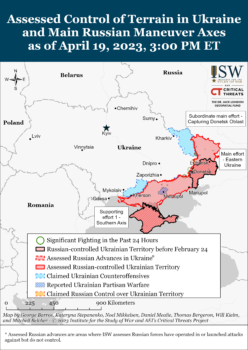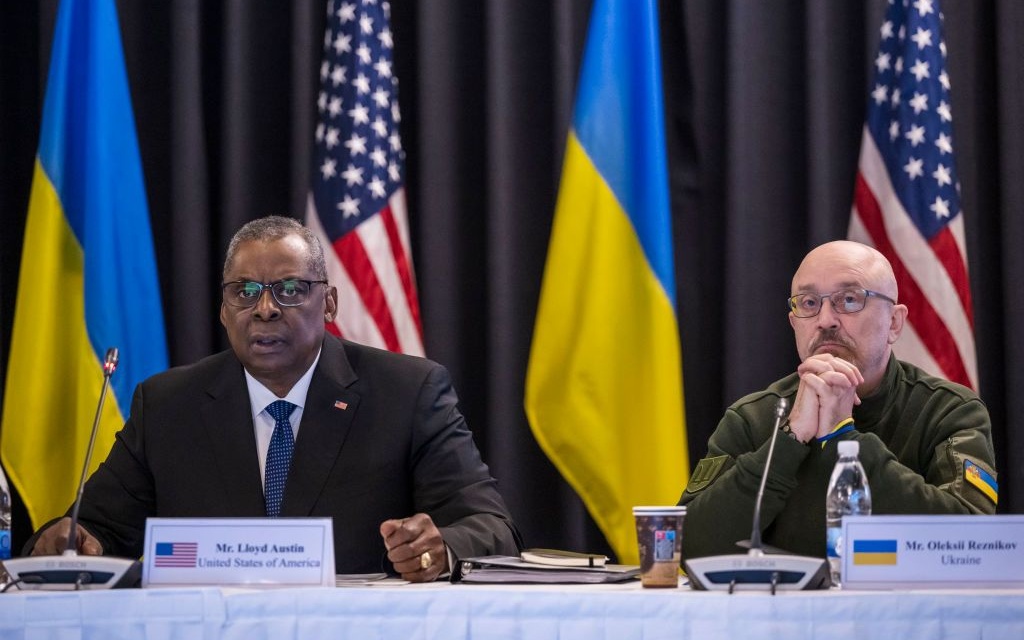Ukraine Defense Minister Oleksii Reznikov (R) and US Defense Secretary Lloyd Austin at the meeting of the Ukraine Support Group, Rammstein, Germany, April 21, 2023
VideoCast Special: Russia’s Ukraine Invasion and the 21st-Century World
US Intelligence: Ukraine Military Proposed Attacks on Russian Forces in Syria
Friday’s Coverage: Russian Warplane Bombs Russian Territory

Map: Institute for the Study of War
UPDATE 1013 GMT:
Russia’s deliveries of military supplies to India have been halted because of problems with a payment mechanism amid US sanctions, according to “Indian officials with knowledge of the matter”.
Indian payments of more than $2 billion have been stalled for about a year. Russia has stopped supply of credit for about $10 billion in spare parts and two S-400 missile defense systems that have yet to be delivered.
Moscow is India’s largest supplier of weapons.
India cannot pay in US dollars becuase of concerns about secondary sanctions. Russia is unwilling to accept rupees because of fluctuations in the exchange rate. India does not want to pay in rubles because of worries that it cannot get a fair price for purchases of the Russian currency.
India could use euros or UAE dirhams, but this might bring more scrutiny from the US and push up costs.
A barter deal for the weapons is limited because Russia had a $37 billion trade surplus with India last year.
UPDATE 1000 GMT:
Spanish Foreign Minister José Manuel Albares says six Leopard 2 battle tanks will be sent to Ukraine in the next few days, following by four more in a second delivery.
US Defense Secretary Lloyd Austin said at an international coalition meeting on Friday that nine countries have pledged to supply more than 150 Leopard 2 tanks.
Germany has delivered 18 Leopard 2 tanks, Portugal three, and Poland 14. The UK has despatched 14 Challenger 2 tanks.
Austin added that members of the Ukraine Defense Contact Group had delivered more than 230 tanks and 1,550 armored vehicles “in just a few short months”. With other equipment and ammunition, the assistance supports at least nine new armored brigades.
UPDATE 0706 GMT:
The Alexandrinsky Theater in St. Petersburg has canceled the April and May performances of the 19th-century French play Cyrano de Bergerac.
Earlier this month, an audience member complained to St. Petersburg police that director Nikolay Roshchin was “discrediting” the Russian military in his production.
The police took no action, however, the theater’s management said the spring performances have been cancelled due to “technical issues”.
UPDATE 0644 GMT:
India’s Gatik Ship Management has lost insurance for its fleet after violating an international price cap on Russian oil.
Gatik’s tankers were stripped of protection and indemnity cover that had been provided by the American Club, said “a person familiar with the matter”.
In the past year, 48 Gatik tankers have moved Russian oil. The American Club confirmed that it has halted coverage of 34 of them.
The G7 — the US, France, Italy, Germany, Japan, Australia, and the UK — agreed the $60 per barrel cap on imports of Russian oil last December.
However, some countries — notably India, Turkey, Singapore, the UAE, and China — have circumvented the gap by importing Russian supplies, refining the oil, and then re-exporting it.
see also EA on India’s WION News: The 5 Countries Helping Russia Circumvent Oil Sanctions
Earlier this week, the US Treasury warned American companies about possible evasion, highlighting oil exported through the Eastern Siberia Pacific Ocean pipeline and ports in eastern Russia.
ORIGINAL ENTRY: In a meeting in Rammstein, Germany, members of an international coalition have said that Ukraine’s air defenses must be bolstered.
At the same time, the group spoke hopefully about a forthcoming Ukrainian counter-offensive to liberate territory from Russian invaders.
US Defense Secretary Lloyd Austin opened the meeting, “Our support for the forces of freedom in Ukraine holds strong and true. At today’s contact group meeting, we’ll focus on three key issues – air defense, ammunition and enablers.”
Early this year US intelligence assessed that Ukraine could run out of S-300 missile defense systems amid waves of Russian missile and drone strikes.
While the Russian waves have abated — the last major assault across Ukraine was on March 9 — the US Chairman of the Joint Chiefs of Staff, Gen. Mark Milley, said that the “most important thing right now” is to make air defense system “robust” and “rigorous”. He said it must be “layered from high altitude to mid-altitude, altitude and from short range and mid-range to long range”.
NATO Secretary General Jens Stoltenberg that the coalition is already responding to the need. He noted this week’s arrival in Ukraine of Patriot air defense systems from the US, Germany, and the Netherlands.
See also Ukraine War, Day 421: Patriot Air Defense Systems Arrive
From Defense to a Counter-Offensive…and NATO Membership?
Stoltenberg continued:
I’m confident that they will now be in a position to be able to liberate even more land. One of the main issues here today has been to go through all the different capabilities, systems, supplies that the Ukrainians need to be able to retake more land.
Ukraine Defense Minister Oleksii Reznikov tweeted, “Ukraine has reached unprecedented levels of interoperability with NATO. We are, de facto, already a part of the Alliance’s security space.”
He continued that he told Stoltenberg of his hope that “this would expedite political decisions regarding our country’s NATO integration”.
Stoltenberg confirmed that Ukraine will eventually join the 31-nation alliance after the Russian invasion is defeated. He said Kyiv must have “the deterrence to prevent new attacks”.
German Defense Secretary Boris Pistorius echoed Stoltenberg’s statement. Ukraine is a future member of the bloc, but “first things first” with the support of Ukraine to repel Moscow’s invaders.
He added that Germany, Poland, and Ukraine signed an agreement for a hub to repair German-made Leopard tanks used on the Ukraine frontline.
The trio agreed on finance of €150 million to €200 million ($166.5 miilion to $222 million) a year for the hub, which could begin operations at the end of May.

